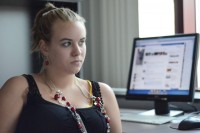
This blog is brought to you by Laura Wilkinson, STAND Communications Intern.
I never thought I would have a connection to the genocide prevention movement. I grew up in North Carolina, in a town of mostly white southerners with little international experience or knowledge. My time in high school, however, got me interested in international affairs and so I went off to N.C. State – a 15-minute drive from the house I grew up in – to pursue degrees in international relations and criminology.
While at State, I took many classes that dealt with conflicts around the world and I eventually became editor-in-chief of the university’s newspaper, which meant most of my day was spent glued to news sites, news on Twitter, and TV news channels. My relatively narrow worldview began expanding at a rapid rate, and to be honest it was a little overwhelming. There was so much going on in the world that I couldn’t come close to understanding!
Then I met Jon* through a mutual friend one night. He was very tall, very dark, and very quiet. But when he spoke, you listened. His words were always soft, but you could tell he said everything with purpose. During the traditional “tell me about yourself” line of conversation, I found out Jon was originally from Liberia and was in the U.S. to attend seminary. Then our mutual friend encouraged Jon to talk to us more about his past, and that’s when I became personally connected to the issues of war crimes, mass atrocities, and ethnic violence.
Jon was forced into becoming a child soldier in Liberia when he was a teenager, along with some of his brothers. He spent more than an hour detailing how soldiers raided his home, threatened his family with death, and swept him into a world of violence. He constantly feared for his life and followed orders to survive, but always thought about making it back home. Eventually he gained the trust of his commander, who left him alone to keep watch one night. After some deliberation, Jon decided to take his chances and escape. Although worried he would be hunted down and killed for fleeing, he made it home safely and never heard from his former commander again.
He was not comfortable talking about many of the specific horrors he faced, and I’m not sure if he will ever be comfortable talking about it – and that’s OK. While recounting his experiences, his mind seemed to wander away from the present and it felt like he was reliving that part of his life somewhere in his mind, not paying attention to the present company.
Meeting Jon and hearing about his life as a child soldier during Liberia’s civil war was life-changing for both myself and others in the room. So after moving to Washington, DC for graduate school I jumped at the opportunity to get involved with STAND. I want to be a part of the genocide prevention movement so I can stand up for people like Jon, whose story may never be heard elsewhere.
*Name has been changed.
